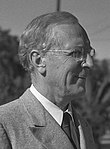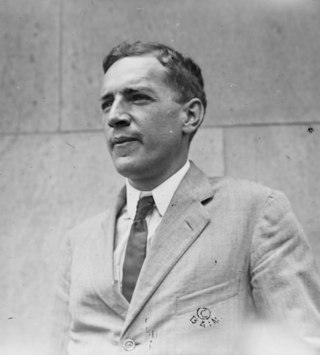
Upton Beall Sinclair Jr. was an American writer, muckraker, political activist and the 1934 Democratic Party nominee for governor of California. He wrote nearly 100 books and other works in several genres. Sinclair's work was well known and popular in the first half of the 20th century, and he won the Pulitzer Prize for Fiction in 1943.

End Poverty in California (EPIC) was a political campaign started in 1934 by socialist writer Upton Sinclair. The movement formed the basis for Sinclair's campaign for Governor of California in 1934. The plan called for a massive public works program, sweeping tax reform, and guaranteed pensions. It gained major popular support, with thousands joining End Poverty Leagues across the state. EPIC never came to fruition due to Sinclair's defeat in the 1934 election, but is seen as an influence on New Deal programs enacted by President Franklin D. Roosevelt.

Clement Calhoun Young was an American educator and politician who was affiliated with the original Progressive Party and later the Republican Party. He was elected to five consecutive terms in the California State Assembly, serving from 1909 to 1919, then as the 28th lieutenant governor of California, holding that office from 1919 to 1927. In the 1926 general election, he was elected in a landslide victory as the 26th governor of California and served from 1927 to 1931. Young is considered to have been one of the last governors from the Progressive movement.

Culbert Levy Olson was an American lawyer and politician. A Democratic Party member, Olson was involved in Utah and California politics and was elected as the 29th governor of California from 1939 to 1943. He was the first atheist governor of an American state.

Sheridan Downey was an American lawyer and a Democratic U.S. Senator from California from 1939 to 1950.

Friend William Richardson was an American newspaper publisher and politician, most famous for supporting a 1923 gun control bill aimed at Chinese and Latinos. A member of the Progressive Party and later the Republican Party, Richardson was elected as the California State Treasurer from 1915 to 1923, and shortly afterwards as the 25th governor of California from 1923 to 1927. Richardson's governorship marked a sharp reversal in policies from previous administrations, rolling back many of the Progressive reforms and state governmental agencies put in place by previous governors Hiram Johnson and William Stephens.
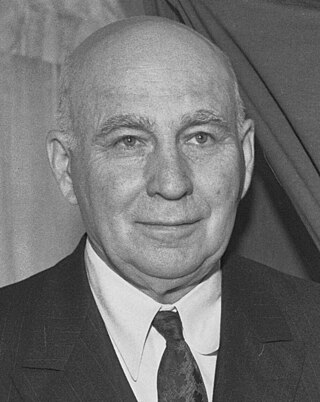
Frank Finley Merriam was an American Republican politician who served as the 28th governor of California from June 2, 1934, until January 2, 1939. Assuming the governorship at the height of the Great Depression following the death of Governor James Rolph, Merriam defeated Democratic nominee Upton Sinclair in the 1934 election. Merriam also served as the State Auditor of Iowa from 1900 to 1903, and served in both the Iowa and California state legislatures.
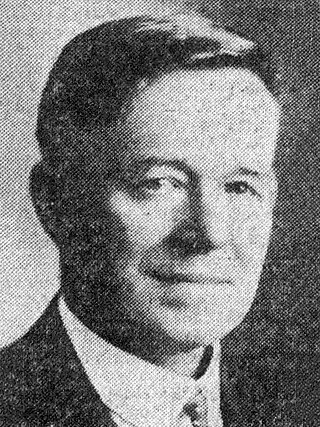
A. J. Barnes was the first person to represent the 12th district of the Los Angeles City Council under the new charter in 1925. He served until 1927.
Clem Whitaker and Leone Baxter were a husband-and-wife team that started Campaigns, Inc., the first political consulting firm in the United States. Based in California, the firm worked on a variety of political issues, mostly for Republican Party candidates. They both supported conservative ideals.
The Progressive Party was a political party created as a vehicle for Robert M. La Follette, Sr. to run for president in the 1924 election. It did not run candidates for other offices, and it disappeared after the election. The party advocated progressive positions such as government ownership of railroads and electric utilities, cheap credit for farmers, the outlawing of child labor, stronger laws to help labor unions, more protection of civil liberties, an end to American imperialism in Latin America, and a referendum before any president could lead the nation into war.

The 1970 California gubernatorial election was held on November 3, 1970. The incumbent governor, Republican Ronald Reagan, won re-election over Democrat and Speaker of the Assembly Jesse Unruh. This would be the closest victory of Ronald Reagan's entire political career.

The 1954California gubernatorial election was held on November 2, 1954. Incumbent Republican governor Goodwin Knight, who had ascended to the office after Earl Warren resigned to become Chief Justice of the United States the previous year, won the election to serve his sole term as Governor of California.
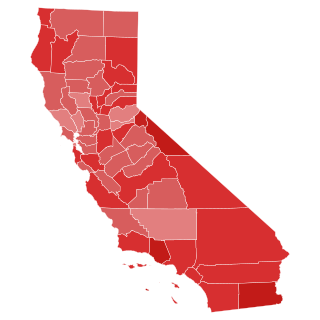
The 1926 California gubernatorial election was held on November 2, 1926. C. C. Young had defeated incumbent governor Friend Richardson for the Republican nomination.
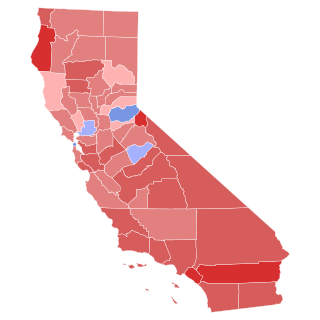
The 1922 California gubernatorial election was held on November 7, 1922. California State Treasurer Friend Richardson defeated incumbent Governor William Stephens in the Republican primary while Los Angeles County District Attorney Thomas L. Woolwine defeated Mattison B. Jones in the Democratic primary. Richardson would defeat Woolwine in the general election and would roll back many of the Progressive reforms made by Stephens and his predecessor, Hiram Johnson.

Raymond LeRoy Haight was an American lawyer and politician from California. Involved in the Republican and Commonwealth-Progressive parties, Haight ran as a third party candidate during the 1934 California gubernatorial election.
The California Progressive Party, also named California Bull Moose, was a political party that flourished from 1912 to 1944 and lasted through the 1960s.

The 1916 Illinois gubernatorial election was held on November 7, 1916. Incumbent Democratic Governor Edward Fitzsimmons Dunne was defeated by Republican nominee Frank Orren Lowden.

The 1942 Wisconsin gubernatorial election was held on November 3, 1942.

The 1938 Wisconsin gubernatorial election was held on November 8, 1938.

The 1932 Wisconsin gubernatorial election was held on November 8, 1932. Incumbent Republican Governor Philip La Follette was defeated in the Republican primary, and in the midst of the Great Depression and nationwide voter dissatisfaction with the Republican Party, Democratic nominee Albert G. Schmedeman defeated Republican nominee Walter J. Kohler Sr. and Socialist nominee Frank Metcalfe with 52.48% of the vote. Schmedeman became the first Democrat to win a gubernatorial election in Wisconsin since George Wilbur Peck in 1892. 2 years later, in 1934, La Follette would run for governor again and defeated Schmedeman, this time running with the Progressive Party.



